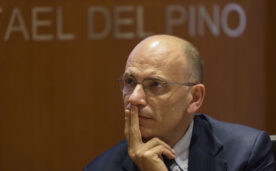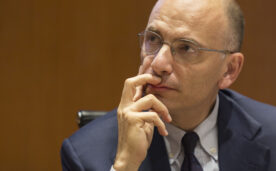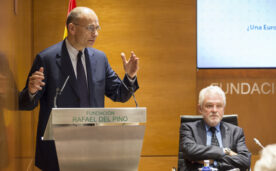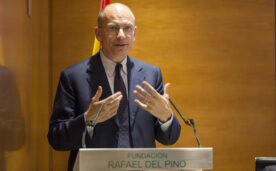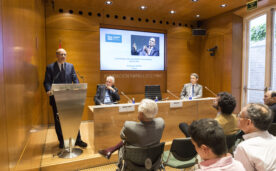On 10 June 2015, the Rafael del Pino Foundation organised the Keynote Lecture "A two-speed Europe? Avoiding Brexit" by Enrico Letta, former Prime Minister of the Republic of Italy.
At a time when politics in Spain and Europe is being written in a collaborative way, Enrico Letta, experienced politician and former Prime Minister of the Republic of Italy, is undoubtedly one of the most qualified people to debate the current situation of European democracies and the state of their integration process.
His appointment to the highest executive political office in Italy was preceded in Enrico Letta's case by the assumption of high responsibilities in various government positions, including Minister of Agriculture, Minister of Industry, Handicrafts and Trade, Minister of European Affairs and Under-Secretary of the Presidency. He was a member of the Chamber of Deputies for Piedmont, Lombardy and Marche and a Member of the European Parliament for the North-East Italian constituency. On 13 February 2014, Enrico Letta resigned as Prime Minister of Italy and was replaced by Matteo Renzi.
Enrico Letta holds a degree in International Law from the University of Pisa and a PhD in European Community Law from the Scuola Superiore Sant'Anna. His leadership skills and his pro-European vocation are beyond doubt. At the age of 25 he became President of the European People's Party Youth and at the age of 32 he was appointed Minister for the first time, becoming the youngest Minister in the history of the Italian Republic.
He is Vice-President of the Aspen Institute Italia and carries out intense teaching and research activity, mainly at the Scuola Superiore Sant'Anna in Pisa and the Haute Ècole de Commerce in Paris. His publications include: Euro yes - Dying for Maastricht (1997); The Competitive Community (2001); Dialogue on Europe (2002); The Enlargement of the European Union (2003); Journey through the Italian Economy (2004); The Europe of Twenty-Five (2005); A Child is Being Born Right Now (2007); Building a Cathedral (2009).
Days after his resignation as PD authority, on 24 April 2013 he was invited by the President of the Republic, Giorgio Napolitano, to form a government, initiating contacts with the political parties.
Almost two months after the 2013 general elections in which the Democratic Party won, on 28 April 2013, he was appointed President of the Council of Ministers after having achieved the necessary majorities to form a government led by his political force, the Democratic Party, in collusion with the centre-right liberal-conservative People of Freedom party led by Silvio Berlusconi and the Civic Election party led by Mario Monti.
On 13 February 2014, Letta announced his resignation due to discontent within his own Democratic Party in parliament over the climate of instability in Italy. He was replaced by Matteo Renzi.
